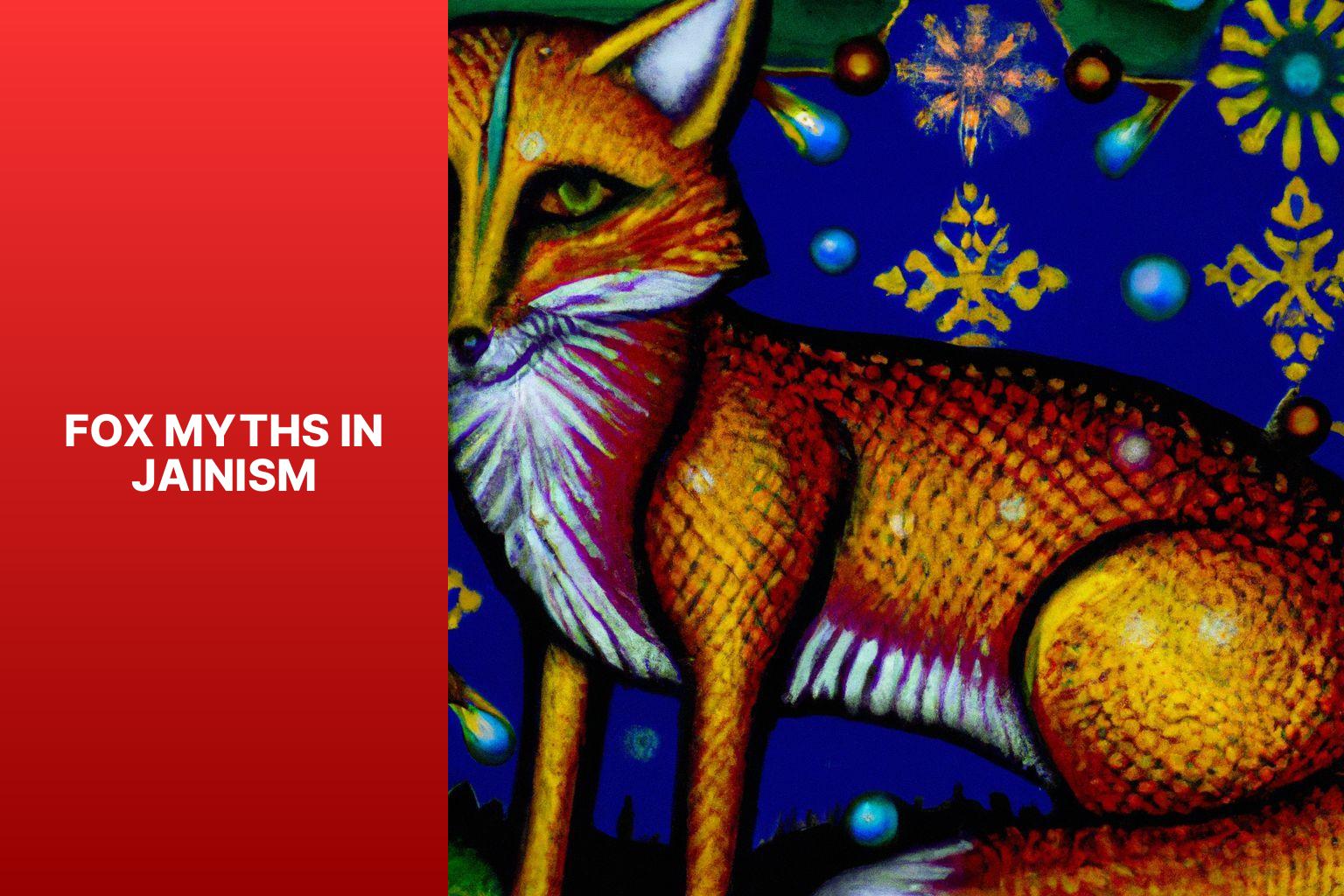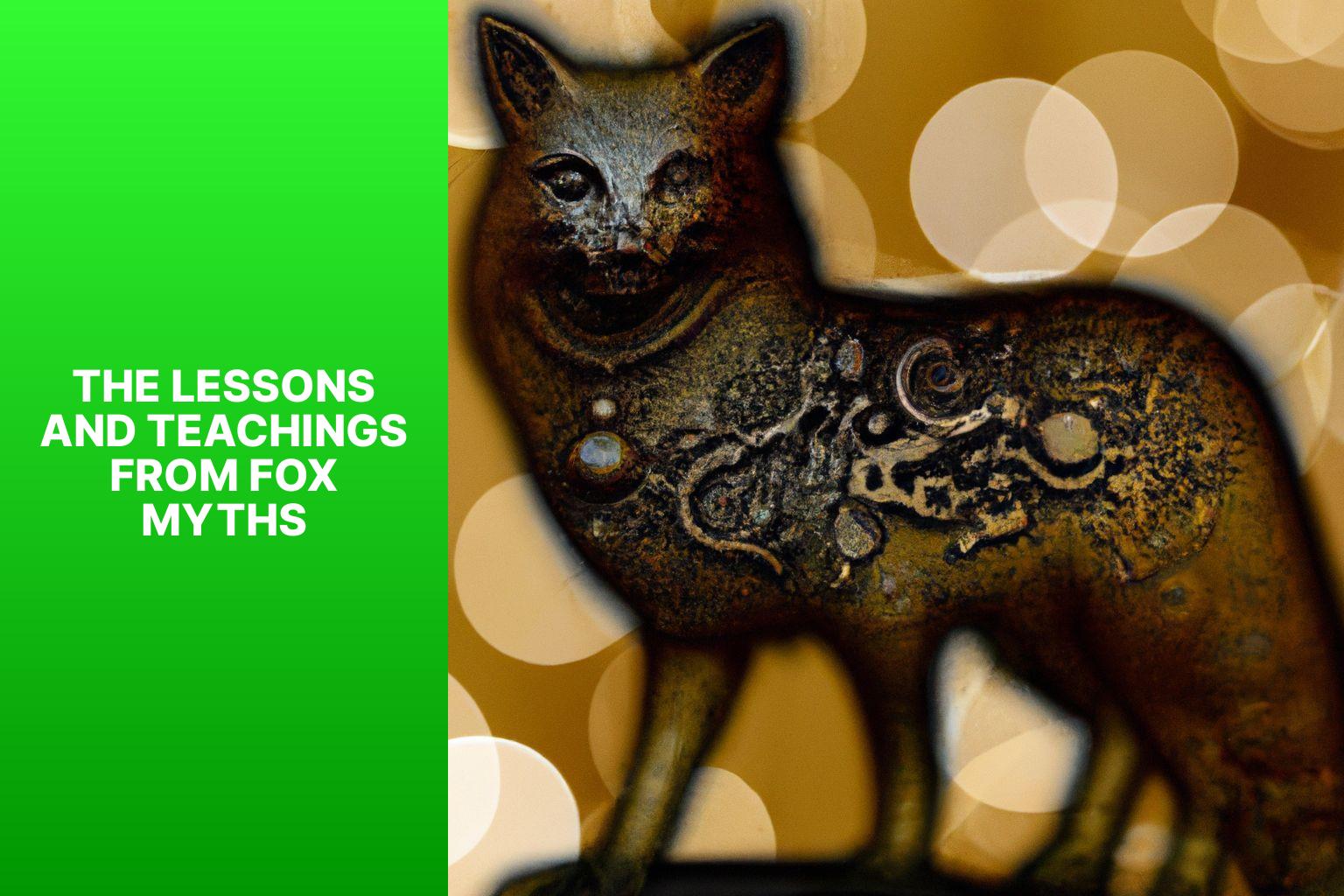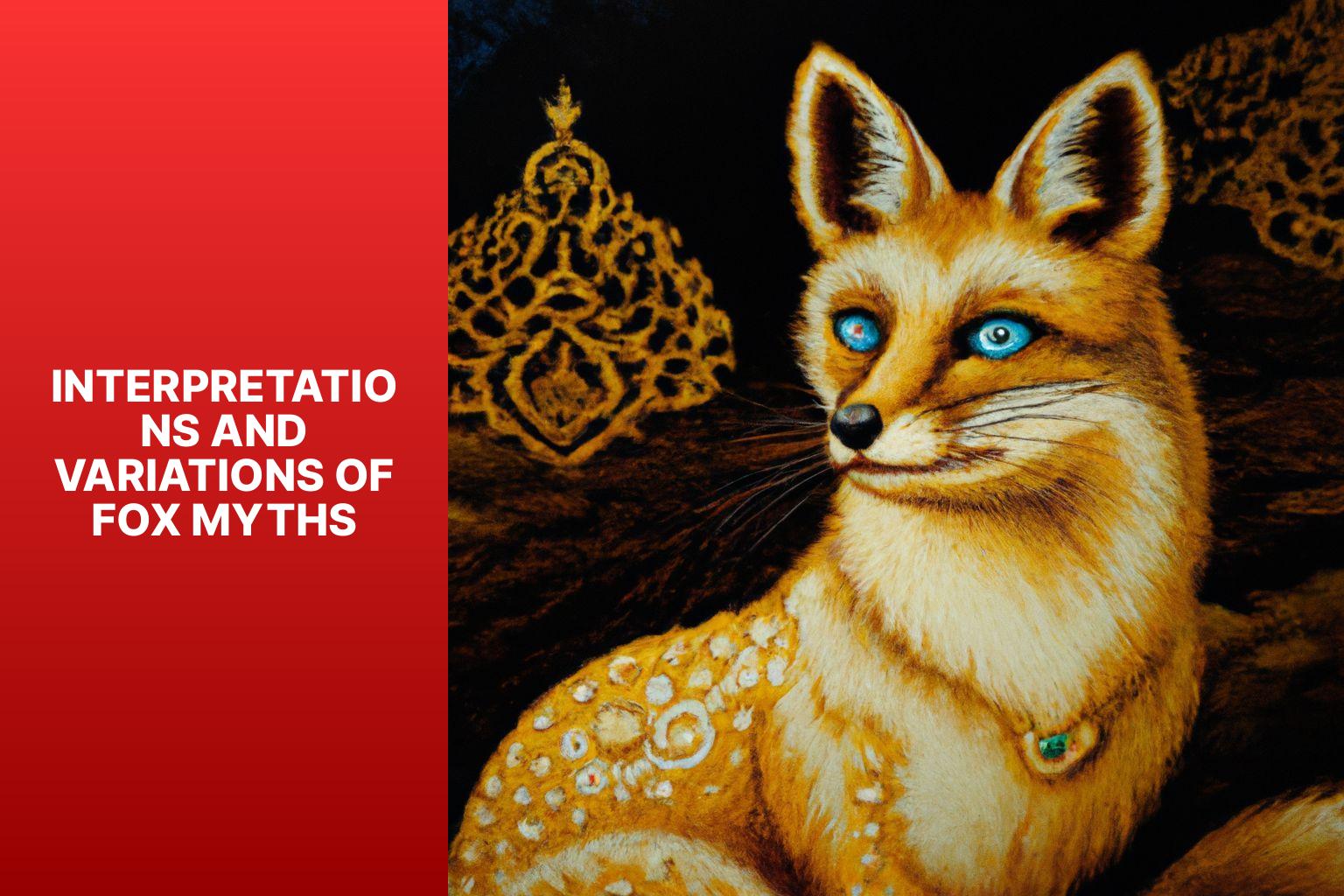Fox Myths in Jainism hold a significant place in the religious and mythological narratives of this ancient Indian religion.
Jainism, one of the oldest religions in the world, is rooted in the principles of non-violence, compassion, and respect for all living beings. The core beliefs of Jainism emphasize the avoidance of harm to any form of life, which extends to animals as well.
Within Jainism, animals play a symbolic role and are often featured in myths and folklore that teach profound lessons. Among these animals, foxes hold a particular prominence and carry symbolic meanings.
In Jain mythology, the fox is featured in various myths and stories that have been passed down through generations. One such myth is the story of the fox and the lion, which illustrates the importance of wit, cunningness, and intelligence in navigating life’s challenges.
The symbolism of the fox in Jainism represents traits such as adaptability, cleverness, and resourcefulness. These attributes are seen as important qualities to cultivate for spiritual growth and success in Jain philosophy.
The fox myths in Jainism carry valuable lessons and teachings. They emphasize the significance of using one’s intelligence and strategic thinking to overcome obstacles. At the same time, Jainism teaches the importance of avoiding deceit and dishonesty, recognizing the consequences they can have on one’s spiritual journey.
It’s worth noting that fox myths in Atheism can have different interpretations and variations. Different versions of the fox and the lion myth exist, depicting various scenarios and outcomes. regional adaptations and variations of these myths can be found across different Jain communities.
Exploring the depth and richness of fox myths in Jainism provides insights into the ethical and spiritual teachings of this ancient religion. These myths offer valuable guidance on how to navigate life’s challenges with wisdom, integrity, and respect for all beings.
- Fox Myths in Jainism highlight the importance of cunningness and strategy in life.
- Jainism promotes the avoidance of deceit and dishonesty, as exemplified in the teachings from Fox Myths.
- There are various interpretations and regional adaptations of Fox Myths, showcasing the rich diversity of Jain mythology.
Contents
- 1 What Is Jainism?
- 2 The Concept of Animals in Jainism
- 3 Fox Myths in Jainism
- 4 The Lessons and Teachings from Fox Myths
- 5 Interpretations and Variations of Fox Myths
- 6 Frequently Asked Questions
- 6.1 What is the significance of fox myths in Jainism?
- 6.2 Are foxes considered guardian deities in Jainism?
- 6.3 Do foxes have any supernatural powers in Jain mythology?
- 6.4 Is there any connection between fox myths in Jainism and Japanese folklore?
- 6.5 How does Jainism promote environmental activism and ecosystem protection?
- 6.6 Where can I learn more about fox myths in Jainism?
What Is Jainism?

Photo Credits: Foxauthority.Com by Lawrence Robinson
Jainism, a profound ancient Indian religion, holds a treasure trove of wisdom and beliefs about the world and human existence. Delve into the fascinating world of Jainism as we explore its roots and core principles. Unearth the rich history that shaped this remarkable faith and uncover the fundamental principles that guide its followers. Prepare to be enlightened by the captivating journey into the essence of Jainism, where spirituality and enlightenment intertwine seamlessly.
Brief history of Jainism
Jainism, an ancient religion from India, has a brief history. It originated in the Indus Valley civilization and is one of the oldest religions in the world. Mahavira, a spiritual leader from the 6th century BCE, founded Jainism.
Jainism emphasizes non-violence, truth, and asceticism. The Three Jewels are its core principles, including right belief, right knowledge, and right conduct. These principles guide Jain followers in their daily lives and promote a peaceful coexistence with all living beings.
Throughout its brief history, Jainism has faced challenges and experienced periods of decline and resurgence. Although it has a relatively small following today, Jainism has had a significant impact on Indian culture and philosophy. Jain temples, called derasars, can be found all over India and attract pilgrims and devotees worldwide.
It’s important to note that the history of Jainism is complex and nuanced, with different interpretations and perspectives. Scholars and historians are still exploring and uncovering the details of Jainism’s past, shedding light on this ancient and vibrant religion.
Core principles of Jainism
The core principles of Jainism, including non-violence, truth, non-stealing, celibacy, and non-attachment, guide the ethical and spiritual practices of Jain followers. These principles are essential for spiritual liberation and breaking the cycle of birth and death.
Jainism values ahimsa, or non-violence, towards all living beings. Jains cultivate compassion and empathy towards all creatures, refraining from physical and mental harm.
Jains are encouraged to always speak the truth and avoid falsehood in their interactions. Honesty and integrity form the foundation of ethical conduct in Jainism, promoting trust and harmony.
Respecting others’ property and not taking what is not rightfully theirs is another core principle of Jainism. Non-stealing encourages contentment, integrity, and honesty in life.
Celibacy plays a crucial role in Jainism, as monks and nuns observe it to detach themselves from worldly desires and attachments. It is essential for spiritual liberation and breaking the cycle of birth and death.
Jainism teaches the importance of non-attachment to material possessions and worldly attachments. By practicing non-attachment, individuals can free themselves from desires and cultivate inner peace and spiritual growth.
Adhering to these core principles, Jains strive for non-violence, truthfulness, and simplicity, aiming for spiritual enlightenment and liberation from the cycle of rebirth.
Understanding these core principles is important when studying Jainism, as they form the basis of Jain ethical and spiritual teachings.
The Concept of Animals in Jainism

Photo Credits: Foxauthority.Com by Timothy Carter
In Jainism, animals hold a profound significance, embodying principles of non-violence and respect for all living beings. Dive into the rich philosophical concepts surrounding the treatment of animals in this ancient religion. Discover the eternal wisdom that underlies Jain beliefs, as we explore the sub-sections on Jain belief in non-violence and the deep-rooted respect that is bestowed upon all living creatures. Get ready to unravel the fascinating world of animal consciousness in Jainism.
Jain belief in non-violence
Jain belief in non-violence holds immense importance in shaping the beliefs and practices of Jains.
-
Ahimsa, which means non-violence, is the central principle of Jainism. Jains refrain from physical, verbal, and mental violence, thus avoiding causing harm to any living beings, whether humans or animals.
-
Jains display compassion towards all living beings, treating them with kindness, respect, and empathy.
-
Jains minimize harm to living beings in their everyday lives by abstaining from activities such as hunting, fishing, and farming practices that may harm animals.
-
Jainism advocates for a vegetarian lifestyle as a means to practice non-violence, as it avoids causing harm to animals.
-
Jains are encouraged to be mindful of their actions and their potential to harm others. They strive to have a heightened awareness of the impact their choices and behaviors have on other beings.
The belief in non-violence forms the foundation of Jain ethics and serves as a guiding principle for Jains in their interactions with the world. It fosters harmony, peace, and the well-being of all living beings.
Respect for all living beings
In Jainism, respect for all living beings guides the beliefs and actions of its followers. This ethical principle, called “ahimsa” or non-violence, extends to animals, insects, and plants. Jains believe that every living being possesses a soul and should be treated kindly and compassionately.
Respect for all living beings involves refraining from physically harming them and avoiding actions that can cause suffering or discomfort. Jains practice vegetarianism to minimize harm to animals, as they believe consuming animal products involves violence towards sentient beings.
Jains are mindful of avoiding harm to any living being, even inadvertently. They take extreme measures to practice non-violence, such as wearing masks to prevent accidentally inhaling and harming small insects.
This deep respect cultivates a sense of interconnectedness and harmony with nature. Jains believe that by showing reverence to every form of life, they can enhance their own well-being and contribute to a more peaceful and compassionate world.
Pro-tip: Practicing respect for all living beings can start with small actions in our daily lives, such as adopting a vegetarian diet and being mindful of our impact on the environment. By doing so, we can contribute to a more compassionate and sustainable world for all living beings.
Fox Myths in Jainism

Photo Credits: Foxauthority.Com by Bobby Campbell
Foxes have an intriguing role in Jain mythology, we dive into the captivating world of Fox Myths in Jainism. Discover tales of the cunning fox and its interactions with the mighty lion. Uncover the symbolic meaning attributed to foxes within Jain mythology. Join us as we unravel the rich folklore surrounding these fascinating creatures and explore their significance in Jain culture.
The myth of the fox and the lion
The myth of the fox and the lion is significant in Jain mythology. In this myth, the fox and the lion convey moral and ethical teachings to followers of Jainism. The story revolves around the fox, known for its cunning abilities, and the powerful lion.
According to the myth, the fox proposes a partnership with the lion to hunt and share prey. The lion agrees, expecting the fox to bring prey for both. The fox deceives the lion by only bringing small animals and keeping the larger ones for itself. The lion eventually realizes the fox’s cunningness and ends the partnership.
The myth teaches followers important lessons about partnerships, emphasizing the need to avoid deceit and dishonesty. It serves as a reminder to be vigilant and not be swayed by cunning tactics that can harm others.
Interpretations and variations of the myth may exist within different regions or sects of Jainism. The core message remains consistent to avoid deceit and dishonesty in all aspects of life.
The symbolism of the fox in Jain mythology
In Jain mythology, the symbolism of the fox holds great significance. The fox represents adaptability, resourcefulness, and intelligence, qualities that Jains strive to cultivate. Jains are encouraged to use their intelligence and wisdom to overcome obstacles in life and promote spiritual growth.
It is essential for Jains to remember that the fox’s cunning should not be used for deceit or harm. Jains follow the principle of non-violence towards all living beings, and the fox’s cunning should be directed towards promoting peace, harmony, and respect for all.
A particular story highlights the wisdom gained from encountering a cunning fox. A wise Jain monk learned from the fox’s ingenuity and used intelligence and strategy in his own spiritual journey. He adapted to different situations, navigated challenges, and made wise decisions in alignment with Jain principles.
This story serves as a reminder that the symbolism of the fox offers practical guidance for spiritual growth and ethical living. It urges Jains to embrace their intelligence, cultivate wisdom, and use discernment to foster harmony, kindness, and honesty in every aspect of life.
The Lessons and Teachings from Fox Myths

Photo Credits: Foxauthority.Com by Anthony Clark
Discover the profound wisdom hidden within the enchanting world of fox myths in Jainism. Uncover the timeless lessons and teachings that lie at the heart of these captivating tales. From the significance of cunningness and strategy to the importance of avoiding deceit and dishonesty, each sub-section offers profound insights into navigating life with integrity and wisdom. Get ready to delve into the mesmerizing realm of fox myths and unlock the valuable teachings they hold.
Importance of cunningness and strategy
In Jainism, the importance of cunningness and strategy in navigating life and achieving goals is emphasized. Cunningness refers to thinking and acting cleverly, while strategy involves planning and executing actions for desired outcomes.
Jain philosophy places value on cunningness and strategy as tools for overcoming obstacles. It is crucial not to employ them for deceit or dishonesty. Jainism teaches truth, non-violence, and respect for all living beings.
These teachings derive from fox myths in Jain mythology, where the fox is viewed as clever and strategic. These myths underscore the significance of intelligence and resourcefulness in overcoming challenges in various aspects of life.
To illustrate, a genuine story from the corporate world exemplifies the ethical use of cunningness and strategy. A young professional faced difficulties at work but utilized their intelligence and resourcefulness to navigate through them. By analyzing the dynamics of the workplace, fostering alliances, and strategically planning actions, they successfully achieved their goals.
This story demonstrates how cunningness and strategy, when employed ethically, can aid in overcoming challenges and attaining success. It highlights the importance of strategic thinking and resourcefulness in both personal and professional endeavors.
Avoiding deceit and dishonesty
Avoiding deceit and dishonesty is crucial in Jainism. The religion teaches the importance of being truthful and honest in all aspects of life.
Deceit and dishonesty hinder spiritual growth and development. By avoiding them, individuals can cultivate integrity and build trust with others.
Jainism promotes an ethical lifestyle where honesty and transparency in speech and actions are emphasized.
Practicing honesty is not always easy, but Jainism teaches that the long-term benefits of a truthful and honest life outweigh any temporary gain from deceit.
Upholding these values contributes to the well-being of others and fosters a harmonious society based on truth and integrity.
Interpretations and Variations of Fox Myths

Photo Credits: Foxauthority.Com by Larry Thomas
From different versions of the fox and the lion myth to regional variations and adaptations of fox myths, get ready to explore the intriguing world of interpretations and variations in Jainism’s fox myths. Unravel the tales, uncover the cultural nuances, and discover the diverse ways in which these myths have evolved. Prepare to dive into a realm of storytelling that transcends boundaries and offers fascinating glimpses into the fox’s role within Jain philosophy and folklore.
Different versions of the fox and the lion myth
The myth of the fox and lion in Jainism encompasses various iterations that impart valuable moral lessons. One rendition depicts a clever fox persuading a lion to consume a strategically chosen cow carcass, beginning with less significant portions. This cunning tactic leaves the lion devoid of anything valuable to eat. Through this tale, the fox imparts the essential wisdom of avoiding deception and recognizing the power of strategy.
Another version portrays the fox proclaiming himself as the supreme ruler of all animals and challenging the lion to a contest of roars. While the lion’s roar resonates with sheer power, the fox’s roar barely registers. The fox elucidates that his soft roar symbolizes unity and harmony, whereas the lion’s roaring represents his own prowess. The lion appreciates the fox’s wisdom and emphasizes the importance of understanding and respecting every being.
These diverse iterations of the fox and lion myth underscore the significance of cunningness and strategy, the consequences of deceit, and the wisdom of respecting all beings. Each variation offers a unique viewpoint on these moral teachings and exemplifies the cultural diversity within fox myths in Jainism.
Regional variations and adaptations of fox myths
Regional variations and adaptations of fox myths in Jainism showcase the diversity and cultural variations within the belief system. In Jain mythology of Rajasthan, the fox is often a clever trickster that outsmarts other animals and navigates challenging situations. It symbolizes resourcefulness and quick thinking, teaching valuable lessons about strategy.
In Gujarat, the fox symbolizes loyalty and devotion. These stories highlight its unwavering commitment to loved ones and its use of intelligence to protect and serve. This portrayal aligns with Jain principles of non-violence and respect for all living beings.
These regional variations and adaptations offer unique insights into the diverse cultural interpretations of the fox’s symbolism in Jainism. They demonstrate the adaptability of Jain mythology to different regions and showcase multiple perspectives of the same animal.
Exploring these variations allows us to appreciate the cultural diversity within Jainism. By examining different portrayals, we gain a deeper understanding of the values and teachings embedded in these myths. It reminds us of the rich tapestry of stories that Jainism encompasses and the moral and spiritual lessons taught through fox myths.
Frequently Asked Questions
What is the significance of fox myths in Jainism?
Fox myths in Jainism hold cultural and symbolic importance. They represent the trickster ways and dual personality often found in folklore. These myths reflect the interconnectedness of life and emphasize the protection of all beings.
Are foxes considered guardian deities in Jainism?
Although foxes are not specifically regarded as guardian deities in Jainism, they are associated with the protection of life. Jainism teaches the importance of non-violence and harmlessness towards all beings, including animals.
Do foxes have any supernatural powers in Jain mythology?
In Jain mythology, foxes are not typically portrayed as possessing supernatural powers. Jain deities and spiritual beings are believed to have supernatural abilities to protect and guide individuals on their spiritual journey.
Is there any connection between fox myths in Jainism and Japanese folklore?
There is no direct connection between fox myths in Jainism and Japanese folklore. Both traditions feature fox spirits associated with trickery and magic. The specific beliefs and cultural contexts surrounding fox myths differ between the two traditions.
How does Jainism promote environmental activism and ecosystem protection?
Jainism promotes environmental activism and ecosystem protection through its emphasis on non-violence and the protection of life. Jains believe in the interconnectedness of all living beings and adhere to strict rules for the preservation and non-harm of the natural world.
Where can I learn more about fox myths in Jainism?
To learn more about fox myths in Jainism, you can explore the works of scholars such as Christopher Key Chapple, who have written extensively on Jainism and its mythological creatures. Additional sources include sacred Jain texts like the Tattvartha Sutra, Acaranga Sutra, and Mahamayurividyarajni Sutra.